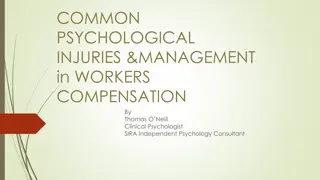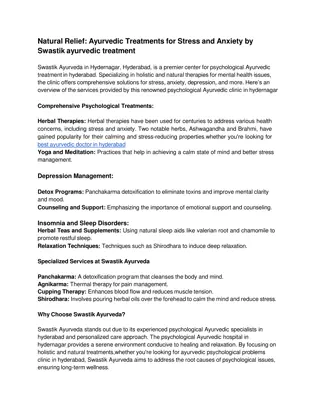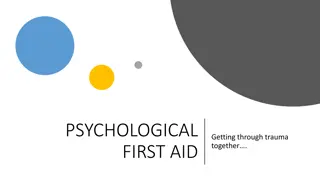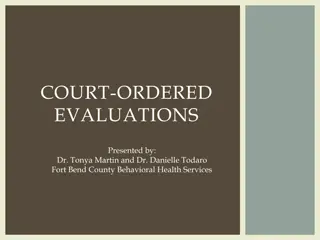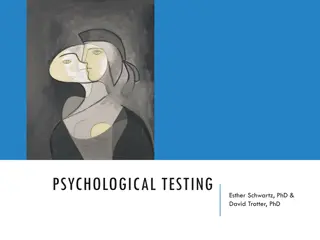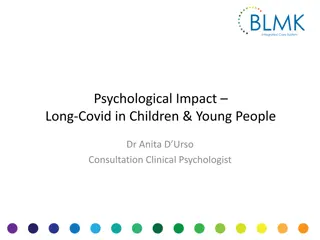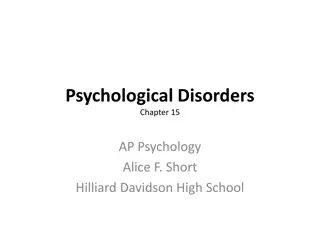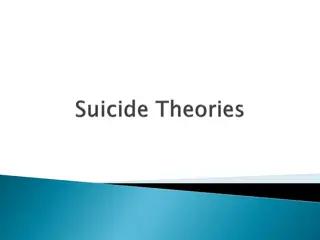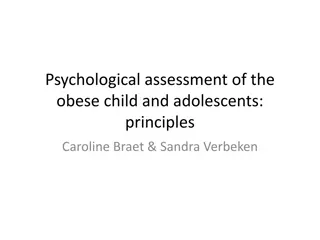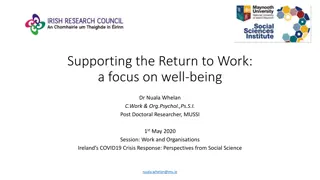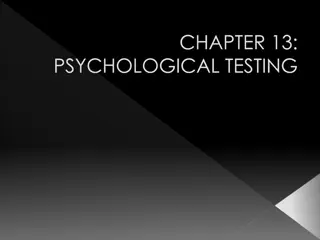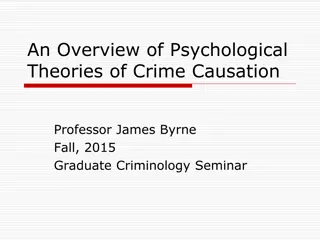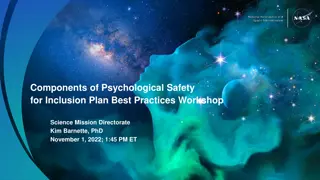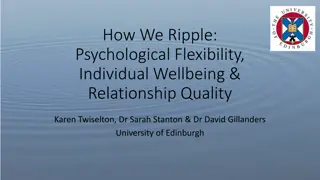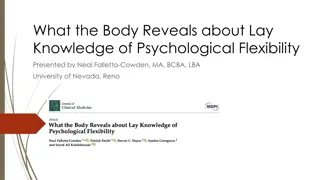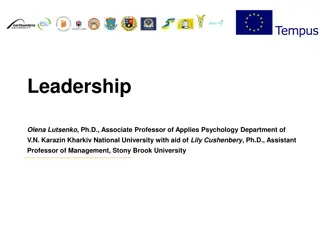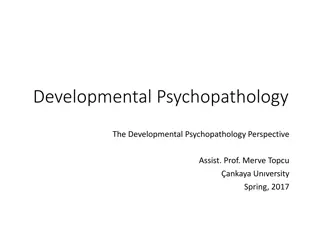Understanding Psychological Claims in the Workplace
Exploring the rise of psychological claims in work comp, this information covers types of mental stress claims, psychological claim regulations by state, standards of causation for physical injury-mental stress and mental stress-mental stress, as well as examples of how work-related stress can impac
1 views • 22 slides
Theories Explaining Deviant Sexual Behavior Throughout History
Explore historical theories on deviant sexual behavior, including demonological, anomie, psychoanalytical, human ecology, and somatotyping theories. These theories range from supernatural beliefs of possession to scientific interpretations of societal influences and individual characteristics.
2 views • 33 slides
Responsibilities in Ensuring Psychological Health and Safety
The primary duty of care under the WHS Act 2011 encompasses physical and psychological health. Non-compliance can lead to significant penalties, including fines and imprisonment. To address psychological impacts, implementing strategies like ALGEE from Mental Health First Aid Australia can help redu
0 views • 8 slides
COMMON PSYCHOLOGICAL INJURIES &MANAGEMENT in WORKERS COMPENSATION
Discover insights on common psychological injuries, such as adjustment disorders, depression, and PTSD, prevalent in the workplace. Gain knowledge on identifying signs, symptoms, and providing crucial support as a case worker. Learn about good mental health, stress responses, and ways to manage psyc
3 views • 17 slides
Understanding and Fostering Psychological Safety at Work
Patricia Murray, a Senior Organizational Psychologist, discusses the importance of recognizing and promoting psychological safety in the workplace. The webinar covers evidence from research, the impact of threats on psychological safety and health, strategies for addressing prolonged exposure to uns
0 views • 17 slides
psychological treatment- Swastik 07_06_2024
We are best Psychological Problems Ayurvedic Treatment and Therapy Specialist Doctor in Nizampet, Kphb, Miyapur Hyderabad. Swastik Ayurveda is one of the best clinic for Psychological Problems.
2 views • 2 slides
Understanding Psychological First Aid in Times of Disasters
Explore the psychological impact of disasters, learn the common reactions, and understand the core actions of Psychological First Aid (PFA). Discover how stress and disasters affect communities and individuals, common reactions to disaster stress, and when professional help may be needed.
0 views • 42 slides
Psychological Theories of Criminality: Understanding the Roots
Psychological theories of criminality delve into the association between intelligence, personality, learning, and criminal behavior. Major theories include Psychodynamic Theory by Freud, Behavioral Theory by Bandura, and Cognitive Theory by Kohlberg. These theories explore how unconscious mental pro
1 views • 20 slides
Understanding Psychological Theories of Criminal Behavior
Psychologically-based criminologists attribute criminal behavior to individual factors such as negative early childhood experiences and inadequate socialization, leading to criminal thinking patterns and incomplete cognitive development. Probation and parole practices are influenced by rehabilitatio
0 views • 30 slides
Court-Ordered Psychological Evaluations and Processes
Explore court-ordered psychological evaluations presented by Dr. Tonya Martin and Dr. Danielle Todaro from Fort Bend County Behavioral Health Services. Understand the purpose, information provided, and expert requirements for such evaluations. The evaluation process involves reviewing records, clini
0 views • 68 slides
Psychological Assessment and Testing Overview
Psychological testing is a vital component of psychological assessment, used to evaluate intelligence, achievement, personality, and psychopathology. This involves gathering information, administering standardized tests, and interpreting results to make diagnoses and recommendations. However, there
0 views • 25 slides
Exploring Leadership Theories: Traits and Behaviors
Leadership theories have evolved from trait theory focusing on personal qualities to behavioral theories emphasizing actions and interactions. While early research sought universal traits for leadership, it encountered challenges due to varied traits among leaders and non-leaders. Behavioral theorie
2 views • 29 slides
Unraveling COVID-19 Conspiracy Theories and Hoaxes
Exploring various conspiracy theories surrounding the origins of COVID-19, from bat soup to bioweapons and espionage. Dive into wilder theories involving population control, world war, and even Disney's supposed predictions. Understand the differences between conspiracy theories and hoaxes, shedding
2 views • 11 slides
Understanding Sociological Theories and Frameworks
Sociological theories, encompassing micro and macro perspectives, provide a lens to interpret societal dynamics. Consensus theories like functionalism emphasize shared norms, while conflict theories such as Marxism highlight social inequalities. Social action theories like interactionism focus on in
3 views • 21 slides
Unbound Minds Psychological Clinic For Children And Adolescent | Book Now
Unbound Minds Psychological Clinic, is a top-notch psychological clinic, we dedicated genuine & best psychological treatment with professional team. Get certified treatment with more benefits. Hire our experienced psychologist and get rid of stress a
1 views • 2 slides
Online Seminar: Theories of Learning in Initial Teacher Education
This collection of online seminar slides introduces pre-service teachers to major theories of learning, including the Science of Learning through cognitive neuroscience. The presentation aims to help educators consider implications for teaching, recognize theories in action, and pose critical questi
1 views • 11 slides
Theories of Causation in Psychological and Social Sciences
Overview of theories of causation categorized into psychological, social psychological, and sociological perspectives. Psychological theories focus on instinctive, biological, and psychological qualities of abusers, including Attachment Theory, Psychodynamic Theory, Social Learning Theory, and Situa
0 views • 15 slides
Introduction to Quantum Chromodynamics & Field Theories in High-Energy Physics
Explore the fundamentals of Quantum Chromodynamics and Classical Field Theories in this informative lecture, covering topics such as global and local symmetries, Lagrangians, actions, and dynamics. Understand the significance of global and local symmetries in classical field theories, along with exa
2 views • 17 slides
Comprehensive Overview of Student Affairs Theories
This collection explores key theories in student affairs, including cognitive-structural theories, learning theories, and person-environment theories. Cognitive-structural theories delve into how individuals process information, while learning theories examine how people absorb knowledge. Person-env
3 views • 19 slides
Understanding Theories and Concepts in Research
The content delves into the fundamental concepts of theories and variables in research. It discusses the nature of theories, including descriptive, explanatory, and predictive theories. Additionally, it examines the role of concepts in providing identity and meaning to objects and phenomena. Through
2 views • 55 slides
Classical Trade Theories and Their Limitations in International Economics
Classical trade theories such as the Theory of Absolute Advantage by Adam Smith and the Theory of Comparative Advantage by David Ricardo highlight the benefits of free trade and specialization based on natural advantages. However, these theories have limitations, such as the inability to explain sce
0 views • 8 slides
Applying Theories and Models in Integrated Health: Module 3 Overview
This module delves into the application of various theories, perspectives, and practice models in integrated healthcare. Students will learn to utilize different theories to enhance their understanding and practice in integrated health, focusing on aspects like personal impact, behavioral change the
0 views • 78 slides
Psychological Impact of Long Covid in Children and Young People
Psychological impact of Long Covid in children and young people includes sleep problems, worsening of pre-existing psychiatric symptoms, emotional distress like depression and anxiety, and mixed results in terms of quality of life and resilience. Beyond physical symptoms, psychological effects such
2 views • 5 slides
Enhancing Sports Performance Through Psychological Skill Training
Sports psychology delves into the psychological factors affecting athletic performance, emphasizing the importance of Psychological Skills Training (PST) to equip athletes with mental skills tailored to their individual needs. These skills techniques help in enhancing self-confidence, goal-setting,
0 views • 29 slides
Accelerating Lemma Learning Using Joins in Satisfiability Modulo Theories
Explore the use of joins in accelerating lemma learning within the context of Satisfiability Modulo Theories (SMT). The study covers various SMT applications at Microsoft and delves into the development of the Z3 solver. Key topics include theories, arithmetic operations, array theory, uninterpreted
0 views • 25 slides
Understanding Psychological Disorders: Theoretical Approaches and Abnormal Behavior
Explore the realm of psychological disorders through theoretical approaches such as the Biological, Psychological, and Sociocultural models. Delve into the complexities of abnormal behavior, including definitions and examples. Gain insights into the impact of biological, psychological, and sociocult
0 views • 47 slides
Significance of Psychological Theories in Understanding Suicidal Behavior
Psychological theories play a crucial role in guiding research, clinical work, and the development of new hypotheses related to suicidal behavior. The Interpersonal-Psychological Theory of Suicidal Behavior emphasizes social forces, such as disturbed regulation of individuals by society, social inte
0 views • 14 slides
Theories and Concepts in Semantics: Classical vs. Prototype Approaches
Explore different theories of concepts in semantics, including classical theories based on necessary and sufficient conditions, causal theories, and prototype theories. Compare their strengths and limitations in handling fuzziness, asymmetry, and internal structure of concepts. Discover how experime
1 views • 46 slides
Integrating Theories and Models for Enhanced Health Practice
Explore the application of theories, perspectives, and practice models in integrated health through Module 3. Learn how theories guide assessment, treatment, and patient outcomes. Discover common theories enhancing assessment and supporting individuals through grief and loss. Gain insights into the
0 views • 78 slides
Psychological Assessment of Obese Children and Adolescents
Principles of psychological assessment in obese children and adolescents are discussed, including the Dietary Restraint Theory (DRT), Affect Regulation Theory (ART), Reinforcement Sensitivity Theory (RST), and Diathesis-Stress Model (DSM). These theories explore the cognitive, emotional, and environ
0 views • 5 slides
Comprehensive Overview of Leadership Theories and Styles
Leadership encompasses the ability to influence a group towards achieving goals by knowing oneself, communicating vision, building trust, and taking effective action. Various leadership styles include Autocratic, Democratic, Free-Rein, and Paternalistic, each with distinct decision-making approaches
0 views • 19 slides
Supporting Well-Being for Return to Work Amidst COVID-19 Crisis: Focus on Psychological Health
Amidst the challenges of returning to work post-COVID-19, it is essential to prioritize well-being and psychological health for a successful transition. Dr. Nuala Whelan's research sheds light on the impact of unemployment, emphasizing the need for support in job matching, upskilling, and psychologi
0 views • 9 slides
The Relationship Between Cognitive Flexibility and Psychological Flexibility After Acquired Brain Injury
This study explores how cognitive flexibility and psychological flexibility interact after an acquired brain injury. It examines whether individuals who exhibit cognitive inflexibility can achieve psychological flexibility, considering the impact of cognitive impairments post-injury. Cognitive flexi
0 views • 21 slides
Understanding Psychological Testing and Intelligence Theories
Exploring the world of psychological testing, this information covers the characteristics of testing such as reliability and validity, standardization, and norms establishment. Delving into intelligence testing theories like Spearman's two-factor theory and Thurstone's opposing views, it sheds light
1 views • 33 slides
Psychological Theories of Crime Causation: An Overview
Psychological theories of crime causation explore factors such as psychological development, childhood experiences, socialization, and individual characteristics that contribute to criminal behavior. These theories delve into the influence of mental disorders, personality traits, and psychoanalytic
0 views • 16 slides
Understanding Psychological Safety for Inclusive Environments
This presentation explores the components of psychological safety according to current research, emphasizing its role in fostering inclusive environments. It delves into the NASA Science Strategic Approach, defines psychological safety based on Dr. Timothy Clark's 4-stage model, discusses team psych
0 views • 11 slides
Psychological Flexibility and Relationship Quality Study
This study explores the relationship between psychological flexibility, individual wellbeing, and relationship quality. It reveals correlations between psychological flexibility, positive affect, negative affect, satisfaction with life, psychological wellbeing, and relationship quality in romantic r
0 views • 18 slides
Understanding Psychological Flexibility through Embodied Knowledge
Psychological flexibility plays a crucial role in mental well-being and behavior. This study explores whether untrained individuals can grasp psychological flexibility concepts based on body language and how people physically express flexibility or inflexibility in response to challenging situations
0 views • 18 slides
Understanding Leadership Theories and Styles
Leadership involves influencing a group towards a common goal. Traits, interaction styles, and group dynamics play vital roles in effective leadership. Various theories, such as Trait Theories and Synthetic Leadership Theories, provide insights into different aspects of leadership. Understanding lea
0 views • 41 slides
Understanding Developmental Psychopathology: Models, Theories, and Perspectives
This content delves into the field of developmental psychopathology, exploring the use of models and theories in understanding maladaptive behaviors. It emphasizes the importance of considering developmental processes and normative behaviors, evaluating theories based on comprehensiveness, parsimony
1 views • 45 slides



